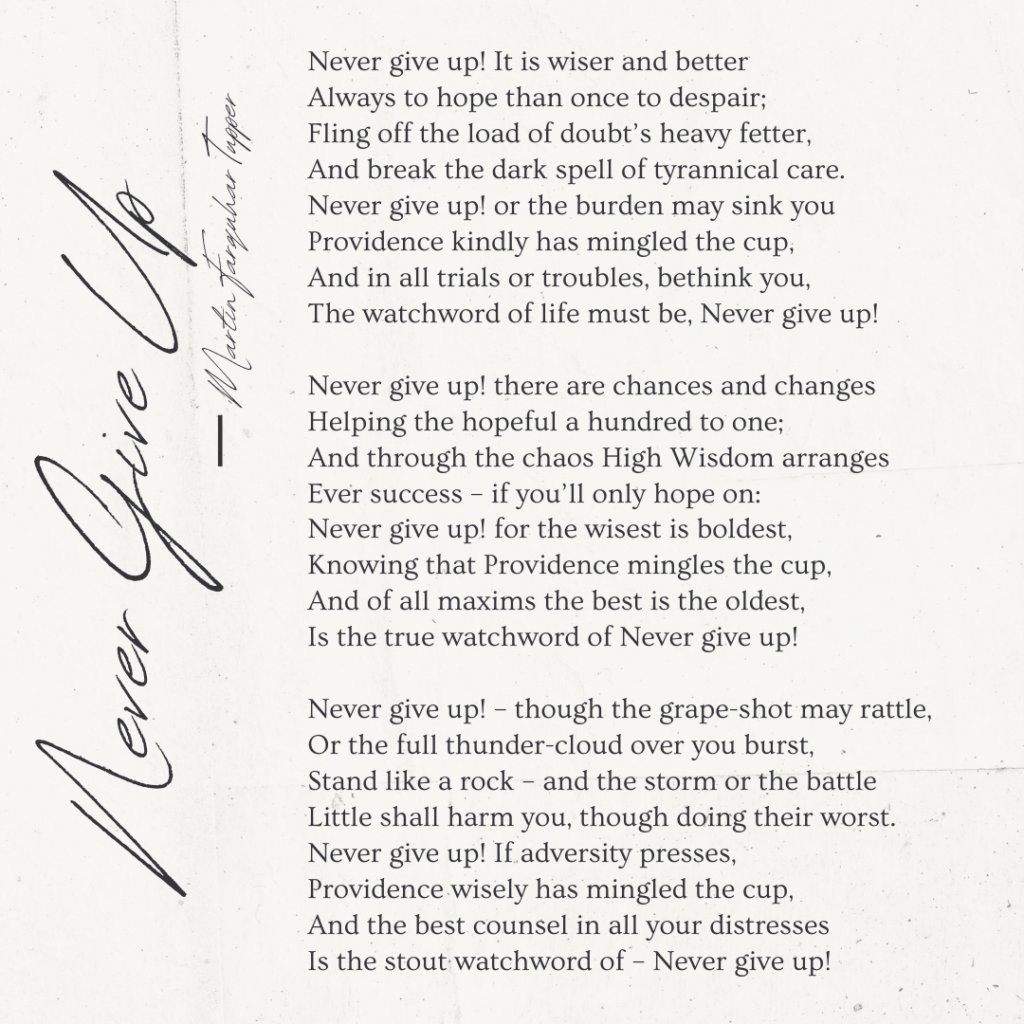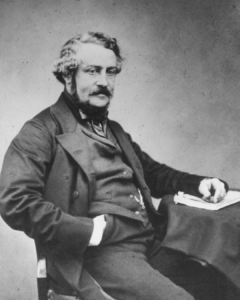
Have you ever faced a challenge that seemed insurmountable, something that pushed you to the brink of giving up?
It’s in these moments that we often seek words of encouragement and strength. This is where Martin Farquhar Tupper’s poem, “Never Give Up!” comes into play.
A timeless piece of literature, Tupper’s words resonate as strongly today as they did when first penned. In a world that constantly tests our resolve, this poem stands as a beacon of hope and perseverance.
“Never Give Up” Poem By Martin Farquhar Tupper

Never give up! It is wiser and better
Always to hope than once to despair;
Fling off the load of doubt’s heavy fetter,
And break the dark spell of tyrannical care.
Never give up! or the burden may sink you
Providence kindly has mingled the cup,
And in all trials or troubles, bethink you,
The watchword of life must be, Never give up!Never give up! there are chances and changes
Helping the hopeful a hundred to one;
And through the chaos High Wisdom arranges
Ever success – if you’ll only hope on:
Never give up! for the wisest is boldest,
Knowing that Providence mingles the cup,
And of all maxims the best is the oldest,
Is the true watchword of Never give up!Never give up! – though the grape-shot may rattle,
Or the full thunder-cloud over you burst,
Stand like a rock – and the storm or the battle
Little shall harm you, though doing their worst.
Never give up! If adversity presses,
Providence wisely has mingled the cup,
And the best counsel in all your distresses
Is the stout watchword of – Never give up!
Meaning of the Poem
At its core, “Never Give Up!” is a rallying cry for persistence and optimism. Tupper skillfully weaves a narrative that encourages us to shed the weight of doubt and despair. He urges us to break free from the “dark spell of tyrannical care” – a vivid metaphor for the overwhelming anxiety and stress that can cripple our spirit.
Each stanza is a reinforcement of this central message, a reminder that no matter how daunting the odds, the act of never giving up is in itself a victory.
The poem begins with an appeal to always maintain hope, as opposed to succumbing to despair. Tupper’s use of language here is deliberate and powerful. The phrase “fling off the load of doubt’s heavy fetter” isn’t just about discarding doubt; it’s a call to action, a physical and mental rejection of the barriers that hold us back. He suggests that in every trial or trouble, we should remember that life’s watchword is to “Never give up!”
As we delve deeper, Tupper presents a perspective that challenges and changes are not just obstacles, but opportunities. He brings in the concept of Providence – a force that kindly mixes our life’s cup, implying that our struggles are part of a larger, meaningful design. This stanza speaks to the hopeful, suggesting that with a positive outlook, success is not just a possibility, but an eventuality.
Then, Tupper addresses adversity with a metaphor of battle and storm. He compares the individual to a rock, unyielding and steadfast, amidst life’s storms and battles. This imagery is powerful and evocative, painting a picture of resilience and strength in the face of life’s metaphorical grape shot and thunder-clouds.
“Never give up!” is not just a poem; it’s a philosophy. Tupper’s words are a testament to the human spirit’s unyielding capacity to overcome. In the face of adversity, when all seems lost, these simple words offer a powerful mantra for moving forward.
About the Author: Martin Farquhar Tupper

Martin Farquhar Tupper, born on July 17, 1810, in London, was a noteworthy English poet and novelist, renowned for his widely-read works in the Victorian era. Educated at Charterhouse and Christ Church, Oxford, Tupper initially pursued a legal career but never practiced, choosing instead to focus on writing.
His literary journey began in 1832 with “Sacra Poesis” and was followed by a series of both verse and prose publications. However, Tupper’s name is indelibly linked with his seminal work “Proverbial Philosophy” (first published in 1838), a collection of moralizing meditations in free verse, covering topics like morality, religion, and the human condition.
This collection, initially received with moderate success in Britain, eventually found tremendous popularity, especially in North America. It was translated into several languages and became a staple in many households, often gifted on special occasions.
Tupper’s style, which he termed “rhythmics” rather than poetry, significantly influenced his contemporaries, including Walt Whitman. Despite a decline in his popularity towards the end of his life and posthumously, Tupper’s works, particularly “Proverbial Philosophy,” remain a testament to the moral and religious sentiments of his time.
Tupper passed away on November 29, 1889, leaving behind a legacy as a prolific writer and a figure who sought to impart wisdom and moral guidance through his literature.
Image and Information Source: Wikipedia
Main Takeaways from “Never Give Up!” by Martin Farquhar Tupper
- Hope Over Despair: Tupper emphasizes the significance of maintaining hope rather than succumbing to despair. This central theme encourages readers to stay optimistic, even in the face of adversity.
- Resilience in Adversity: The poem is a powerful reminder to remain resilient. Tupper’s words inspire readers to withstand challenges and to view them not as insurmountable obstacles but as opportunities for growth and strength.
- The Power of Persistence: A key takeaway is the importance of persistence. The repeated refrain, “Never give up,” serves as a motivational mantra, encouraging continuous effort and determination.
- Overcoming Doubt: Tupper advises shedding doubts and fears that hinder progress. He advocates for a mental liberation from the constraints of uncertainty and anxiety.
- Embracing Life’s Trials: The poem suggests that life’s trials are part of a larger design, implying that each challenge has a purpose and contributes to one’s personal journey.
- Inner Strength: Tupper’s metaphor of standing like a rock against life’s storms symbolizes the inner strength each person possesses to face and overcome life’s toughest moments.
- Universal Relevance: The timeless nature of Tupper’s message highlights that the challenges and the ethos of never giving up are universally relevant, transcending time and context.
The Timelessness of Tupper’s Message
Martin Farquhar Tupper’s “Never Give Up!” holds a timeless appeal, speaking volumes to generations past, present, and likely future. Its enduring nature lies in the universal human experience of facing challenges and the need for resilience.
And the poem’s message is more relevant today than ever before. Whether it’s personal struggles, professional hurdles, or societal challenges, the ethos of never giving up is a constant reminder of human strength and potential.
Tupper’s words transcend the Victorian era, resonating with anyone who has faced a moment of doubt or despair. His message is a universal one: no matter the era, the challenges, or the individual, the spirit of perseverance is key to overcoming obstacles.
Personal Reflections
This poem has been one of my sources of personal inspiration. Its message reminds me of my inner strength and the power of embracing a positive mindset.
Embracing Tupper’s mantra of never giving up has helped me navigate through tough times. Whether it was a challenging project, a personal goal, or a difficult period in life, remembering to persist and maintain hope has been a guiding force.
The poem encouraged me not just to endure but to face my challenges head-on, with the belief that adversity is not an endpoint but a part of the journey to success and self-improvement.
Conclusion
Martin Farquhar Tupper’s “Never Give Up!” is a poem that speaks to the heart of human resilience. Its message is simple yet profound, offering guidance and encouragement to anyone facing challenges.
By exploring its themes and the life of its author, we gain a deeper appreciation for this timeless piece. As readers, we are reminded that hope, perseverance, and a positive attitude are powerful tools in our journey through life.
Tupper’s words encourage us to face our trials with courage and to remember that, in the end, never giving up is perhaps the most powerful choice we can make.



